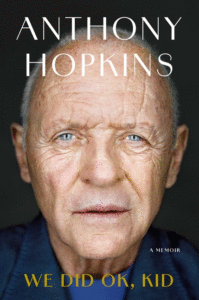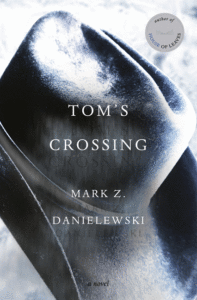
5 Book Reviews You Need to Read This Week
“I seemed to be reading a 1970s-Laurel Canyon version of My Brilliant Friend.”
Our saddlebag of superlative reviews this week includes Lily Meyer on on Ella Berman’s L.A. Women, Anthony Lane on Anthony Hopkins’ We Did Ok, Kid, Kevin Power on Salman Rushdie’s The Eleventh Hour, Kristen Martin on Susan Straight’s Sacrament, and Marcel Theroux on Mark Z. Danielewski’s Tom’s Crossing.
Brought to you by Book Marks, Lit Hub’s home for book reviews.
*
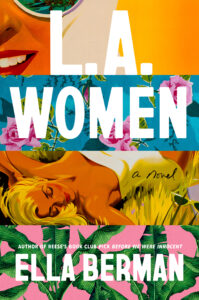
“…the success of the Neapolitan novels seems to have begun to influence breezier genres of fiction. When I began the celebrity-book-club-beloved writer Ella Berman’s third book, L.A. Women, published by the commercial imprint Berkley, I was startled to discover that, in plot terms, I seemed to be reading a 1970s-Laurel Canyon version of My Brilliant Friend … As L.A. Women continues, its narrative diverges from Ferrante’s. The reading experience is different, too: Where Ferrante uses long, intricate sentences to delve into her characters’ tangled histories and emotions, Berman’s prose moves swiftly forward, not asking the reader to linger on complex syntax or motivations that require decoding. Still, the novel continues to seem like an homage to the Neapolitan novels…
…
“For these themes, ideas, and tensions to appear in a commercial novel is, of course, not simply the My Brilliant Friend effect; it would do Berman and other writers in her genre a disservice to say so. Yet it’s telling that a novel that’s clearly meant to be entertaining also engages so intensely with some of feminism’s intractable questions. Its approach suggests that in the years since Ferrante first made her way into American readers’ hands, the status of feminist writing has seen a true shift. Maybe it’s Ferrante; maybe it’s Barbie. But feminist art is getting fun.
…
“Unknowable, anhedonic, and frequently nameless female protagonists are abundant in the literary fiction of the 21st century, in works by Danzy Senna, Katie Kitamura, Christine Smallwood, Claire-Louise Bennett, and others (many of which are quite good). These books can feel obstinate in their refusal of pleasure—an approach that does not seem to interest Berman in the slightest. (One thing that L.A. Women does have in common with these novels is the uselessness of its men. All of them are stock figures, which keeps the readers’ focus on Lane and Gala’s relationship.)
…
“Paying attention to how people enjoy themselves is a way of paying attention to their humanity; not for nothing did John Ruskin write, ‘Tell me what you like and I’ll tell you what you are.’ Making room for levity is, then, a way of admitting the human—not through the granular and intimate detail that lends Ferrante’s novels their power but through a broader concession to nature. Not many of us can be serious all of the time, and L.A. Women’s existence, like Ferrante fever, speaks to an appetite among American readers for works that, in a variety of ways and tones, dig into the misogyny that remains culturally rooted among men and women alike. It’s Lane, after all, who hates the very thought of being like other women—of being seen as the very thing she is. L.A. Women demands, from its title on, that readers do to Lane what she fears, and understand the political value of doing so. Not bad work, I’d say, for any kind of novel to do.”
–Lily Meyer on Ella Berman’s L.A. Women (The Atlantic)
“Herod, Hitchcock, Hitler, Nixon, Picasso: pick one of history’s great softies, and there’s a good chance that he’s been played by Anthony Hopkins. Also on the list are Dickens, Danton, Freud, Yitzhak Rabin, John Quincy Adams, Pope Benedict XVI, St. Paul, C. S. Lewis, and the man who—though this is a matter of crunchy controversy—invented cornflakes. Last year, at the age of eighty-six, Hopkins appeared as the Roman emperor Vespasian on TV, in Those About to Die, the thrust of his performance being to treat the show’s title with scorn. Even his portrayal of a man with advanced dementia, in The Father (2020), which won the Academy Award for Best Actor, emitted a disconcerting power. Vital signs were rampant. Human twilight, with Hopkins in charge, became a noonday blaze.
Those who wish to trace that radiance to its source now have a map to guide them. We Did OK, Kid is a memoir composed by Hopkins—ghostlessly, it would seem, for there is no mention of a co-author. True, he tells us that ‘my life has been written by someone else, not by me,’ but this is not a professional admission. He is referring, instead, to the all-consuming puzzle of his existence and wondering whether it is something that has befallen him, like an accident or a lottery win, rather than a series of events that he has consciously set in motion. ‘I look at my life and remember that hapless little boy, and I think, How did all this happen?’ Hopkins writes. More than a few readers, poring over their own pasts, may find themselves posing the same question.
…
“…feels oddly seized with touchiness and frosted over with regret. A theatre director once said to Hopkins, ‘You just have a head full of Welsh saboteurs,’ and they are still at work, plotting against him, to judge by the texture of this memoir. Much of it unfolds in choppy, stop-start rhythms, and it would be no surprise to learn that Hopkins had dictated the book, pacing to and fro to make his point. So curt are some of his reckonings that they approach the brink of Beckett: ‘I had to shut the feelings down. No tears. No grief. Nothing. Too much agony.’
…
“What divides him from Burton is that Hopkins, by a miracle, summoned the clarity to renounce his own destruction. Maybe it was the news that he’d driven from Arizona to Los Angeles in an alcoholic blackout. (‘We found you on the road,’ his agent said.) The upshot is that he hasn’t drunk since the butt end of 1975 and, nearing ninety, is still employable, whereas Burton died at the age of fifty-eight, not long after playing O’Brien, the purveyor of pure bleakness, in a film of Orwell’s 1984. That was one last flourish of self-laceration, and there is definitely a matching strain of masochism in Hopkins—not so much a relish of suffering as a rueful acknowledgment that earthly woe is our due. Both men, being Welsh, would doubtless smile at the words of Hopkins’s Aunt Patty, who, when informed that the young Anthony was unhappy at school, replied, ‘Oh well, happiness isn’t everything, you know.’”
–Anthony Lane on Anthony Hopkins’ We Did Ok, Kid (The New Yorker)
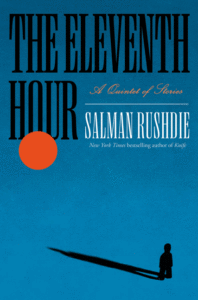
“Rushdie has been one of the deep sources of contemporary fiction. His fingerprints are all over the 21st-century Big Inventive Novel, with its sentient raindrops (Elif Shafak), its melodramatic families (Kiran Desai), its metamorphoses of race (Mohsin Hamid) and history (Marlon James). His influence has not been without its downsides. Rushdie has licensed lesser writers to be sentimental about their own powers of invention. He has given permission for characters to be flattened into comic stickers. And he has presided over a vast boom in telling rather than showing. The events of his own recent novels, such as The Golden House (2017) and Quichotte (2019), have been relentlessly told, rather than dramatized, and the virus of telling—this and then this and then this!—has noticeably infected the contemporary novel. But Rushdie was a pathbreaker. The exuberance and linguistic force of Midnight’s Children is still, after 44 years, a joy to encounter on the page. Another writer might have been fatally discouraged by what Rushdie has gone through. But Rushdie was not. He wrote the books. And the books, many of them, have greatly mattered.
‘Our words fail us, goes the final sentence of The Eleventh Hour. It is the conclusion of a story about a piazza—a public space—in which language, here figured as a human woman, is courted, usurped, ignored. Finally she screams and vanishes, at which point, the piazza’s buildings all crack: ‘The piazza is broken, and so, perhaps, are we.’ Words have not yet failed Salman Rushdie, even if, in this self-consciously late book, the spectacular originality of his novelistic peak sounds more as an echo than as an urgently present voice.”
–Kevin Power on Salman Rushdie’s The Eleventh Hour (The Guardian)
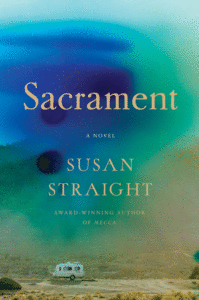
“In the earliest days of the covid pandemic, some in the literary world were already anticipating what the fiction inspired by the period’s uncertainty, grief, fear and sacrifice might look like. Amid the second surge of the virus, in August 2020, the first ‘covid novel’ arrived—Ali Smith’s Summer, the last of a seasonal quartet, written during Britain’s early lockdown, which includes real-time descriptions of the pandemic’s onset. Authors working on slightly less breakneck schedules followed…But as some critics have argued, such novels have mostly contented themselves with illustrating daily life during stay-at-home orders—ambulance sirens blaring, empty grocery shelves—rather than illuminating how the pandemic more deeply transformed us and our world…Susan Straight, who has long written fiction about the people and landscapes of the Inland Empire, the often-overlooked slice of Southern California from which she hails, bucks this trend with her new novel.”
…
“In populating Sacrament with a cast of Black, Mexican American, Indigenous and Filipina essential workers during the pre-vaccine days of covid, Straight transcends the mundanity of covid novels that have concerned themselves with upper-class social distancers.
…
“The greatest feat of Sacrament is how it moves beyond the perpetual here and now of the pandemic. Straight delves into the characters’ long roots, how they carry their past wounds into the present, and how the desperation and isolation of life during covid affect their relationships and their visions of the future. Sacrament is a deeply humane novel about the tenderness and heartache of caring for strangers, the misguided ways we try to protect the people we love the most by hiding our hardest truths, and the strength that can be found in community.”
–Kristen Martin on Susan Straight’s Sacrament (The Washington Post)
“In this moment of cultural panic about the decline of reading, it takes an enviable confidence to deliver a volume such as Tom’s Crossing. Weighing in at more than 1,200 pages of closely printed text, the novel contains, I would hazard, about half a million words—roughly two Ulysses. It’s also, for that matter, about twice the length of Danielewski’s debut, House of Leaves, which secured cult status for its author on publication 25 years ago. Tom’s Crossing is so big that when I got it out on the tube, I felt like that character on Trigger Happy TV with his enormous mobile phone. ‘Look,’ I seemed to be telling the passengers scrolling Instagram on their devices, ‘I’m reading a book!’
The novel is not merely long, it’s also a challenging, deliberately arcane work that insists on its own epic status, yet has at its heart a straightforward and compelling story.
…
“This bald summary doesn’t do justice to the ambition of the book or the brilliance of its plotting. The events take place over a five-day period leading up to Halloween, 1982. Purely as story, Tom’s Crossing hits a western-inflected cinematic sweet spot, with a 1980s setting, young central characters and sweeping landscapes. There are guns, horses, ghosts, a primal struggle for survival in hostile terrain, family feuds and a steadily intensifying sense of mortal threat, as Old Porch’s ambition and psychopathy escalate the drama. And the compressed timeframe of the story ticks down to a hugely satisfying climactic encounter in the mountains.
And yet, for all its obvious virtues, I found Tom’s Crossing a baffling and often infuriating experience. Danielewski is a writer of enormous power and vision. He has invented a gripping story with mythic undertones that need no extra emphasis. Yet he makes a number of aesthetic choices that seem deliberately designed to frustrate normal enjoyment of the novel. One of these is the conceit, established on page one, that the epic events described in the book are already widely known. At umpteen points in the novel, we cut away from the action and explore the thoughts and attitudes of a vast chorus of named characters who have used moments in the story as the basis for their own artworks: opera, songs, sculptures, drawings, art installations. We hear about these in mindboggling detail. There are so many of these choric figures—at one point, a thousand or so names are simply listed in the text without comment—that I wondered if they belonged to Danielewski superfans who had crowdfunded the novel.
–Marcel Theroux on Mark Z. Danielewski’s Tom’s Crossing (The Guardian)
Book Marks
Visit Book Marks, Lit Hub's home for book reviews, at https://bookmarks.reviews/ or on social media at @bookmarksreads.









